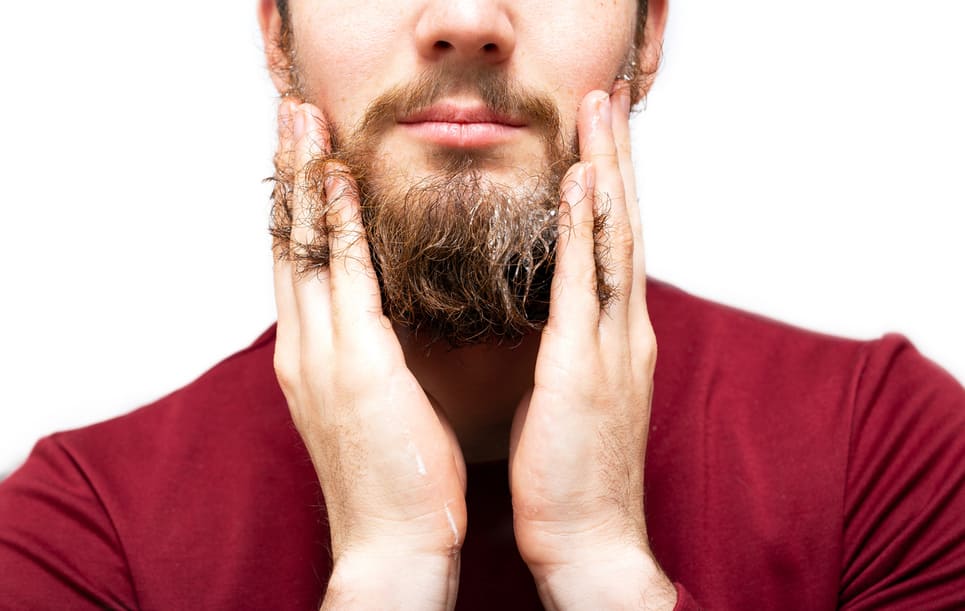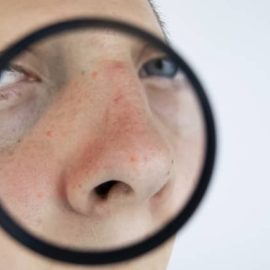As the benefits of using onion extract in terms of beard follicle regeneration and nourishment are more and more known, this natural ingredient remains a top choice for successful beard care formulations.
Plus, the male grooming market is booming, opening a new space for brands to experiment with new product possibilities and narratives. By highlighting a product that employs onion for beard growth, this article highlights the need for BPC companies to watch new trends in this market. One that is now fully separated from the women’s beauty sector, and approach men’s needs with up-to-date strategies that cater to nowadays’ male consumers.
Content
What men want: the male grooming market today
The male grooming market is not only flourishing but maturing around the world. Meaning more men use beauty products and they are increasingly aware of their needs: a 2020 CJ Olive Young survey points out how 74% of male customers aged 20-39 say they have a high level of interest in personal grooming. Whereas 45% say they use different products based on changes in weather and other environmental factors.
At the same time, grooming is now considered an everyday need: 47% of South Korean consumers say that it is important for men to use beauty/grooming products on a daily basis according to Mintel Global Consumer Trends.
Product launches have remained steady to keep up with the increasing male grooming demand, and the last years (including those affected by COVID-19) have seen a spike in brands’ creativity to reach male BPC consumers: from clean male grooming products, hair inhibitors for men, and hair-loss products to new face-mask-friendly products (for instance, hydration formulas that target acne caused by masks).
In such a context, beard care products have become a synonym for male grooming and self-care.
Beard care: what trends to follow for success
Beard care is a male beauty trend that has seen a special growth in the past years, particularly in Western markets, as beard trends grew hand in hand with male self-care narratives.
In order to develop successful beard care products, brands must listen to wider trends in the expanding male grooming market:
- Self-care movement: men are getting more interested in taking care of themselves, a trend that addresses wellness both physically and mentally. BPC products must consider an increasingly stressed population and their need for de-stressing routines, offering products that connect with self-care routines and rituals.
- Natural movement: natural and organic claims are growing in the men’s grooming market – aims that have associations with sustainability are fast-growing in men’s grooming. In fact, natural and sustainable claims present the most significant growth in product launches in Europe and North America comparing figures from the 2015-16 period vs the 2019-20 period, according to Mintel.
- Convenience and efficacy: successful beard care products must take into account how the male grooming market specially values efficacy and convenience. For instance, in Brazil, 36% of men spend less than five minutes a day on their beauty routine (vs 18% of women); and in the US, 32% of men who use personal care products agree that they don’t spend a lot of time on their appearance (Mintel GNDP). Besides, after COVID-19, this trend also aligns with a growing interest in scientific facts, health and safety.
Thus, beard care products must develop convenience-focused products (including “all-in-one” formulas) and build efficacy narratives in order to stand out and appeal to this specific male grooming need. Beards during COVID-19: face masks have had a significant impact on the BPC market, and the male grooming market and beard care products are no different. While it’s true that some consumers have opted out from beards because of the need to wear face masks, others have continued to wear them. The latter thus need specific products that focus on the possible repercussions of wearing a face mask on beards (including skin-soothing and anti-irritation formulas).

Does onion help to grow beard?
Growing a beard is dependent on a variety of factors, from genetics and hormones, including testosterone. Other factors, such as maintaining a healthy diet, getting enough sleep, and exercising regularly, can have an influence on beard growth.
On the other hand, onion extracts contain several vitamins and minerals that are beneficial for overall hair health and which can have an impact on beard growth. This includes Vitamin C (which aids in the production of collagen, a protein essential for hair growth and strength) and Biotin, among other components. All in all, the use of onion for beard growth has a great potential for formulations aiming at helping men grow their beard.
Onion extract for beard growth and anti-irritation: the natural extract to conquer the beard care market
Provital’s Onion Extract GNBN presents the perfect solution for 2021 beard care products. This water-soluble extract uses the natural power of onion for beard growth and presents extra benefits that will appeal to today’s male consumers.
Among its chief benefits, there are at least three advantages that cater to new and old male sensitivities:
- Hair growth stimulation. Growing a full, thick beard is a main priority for those sporting a beard. This extract enhances the natural powers of onion for beard growth, as a study by Sharquie KE & Al-Obaidi HK (2002) proved: in a controlled group, hair re-growth was seen in 73.9%, and, at six weeks, the hair re-growth was observed in 86.9% of patients, and was significantly higher among males (93.7%) compared to females (71.4%).
- Antimicrobial and antiseptic. Targeting new sanitary considerations, this extract amplifies onion’s antimicrobial activity, activated through this plant’s sulfur-containing compounds, its proteins, saponins and phenol compounds, as found by Griffiths G. (2002).
- Anti-inflammatory and anti-irritation. Face mask concerns around skin irritation for bearded men can be addressed by this onion extract’s benefits. As found by Wagner H. et al. (1990) nine thiosulfinates and four cepaenes isolated from onions and/or synthesized by them showed marked inhibitory effects on cyclooxygenase and 5-lipoxygenase, both enzymes involved in inflammatory processes.
Thus, targeting the increasing interest in natural, efficient and anti-irritation beard care products, this onion extract will cater to male consumers preoccupied with their skin health. Using the right self-care narratives and promoting routines and rituals for bearded men, this extract can lead the way for innovative product launches that employ onion for beard growth in an ever-competitive but growing market.
Frequently asked questions about onion extract
What is onion extract good for?
Onion extract is rich in flavonoids, sulfur compounds, and other beneficial plant compounds. As such, it has been proven to have a positive impact in a number of processes, including:
- Anti-inflammatory properties, turning it into a potential remedy for conditions like arthritis, asthma, and other inflammatory diseases.
- Antioxidant activity, helping protect the body from oxidative damage caused by free radicals, which play a key role in several chronic diseases including cancer, heart disease, and Alzheimer’s.
- Wound healing and skin health, because of the combination of its anti-inflammatory and antibacterial properties, as well as its ability to promote collagen production
- Hair growth, as we’ve seen above, it’s common to employ onion for beard growth due to this extract’s capacity to strengthen hair follicles, reduce hair loss and promote scalp health.
How do you get onion extract?
Onion extract can be obtained in a DIY manner by squeezing onions or using a juicer. However, the process followed by cosmetic companies is more complex, which guarantees the obtention of its benefits. The process for obtaining onion extract typically involves the use of a solvent, such as ethanol or water, applied to onion bulbs. The mixture will then follow other steps, such as heating or stirring, and filtering. Concentration may also be applied, so that the solvent is removed.
What is onion extract made of?
Onion extract is made up of various beneficial compounds found in onion bulbs. These include:
- Quercetin: a flavonoid with antioxidant and anti-inflammatory properties.
- Sulfur compounds:such as alliin, which is converted to allicin when the onion is crushed or chopped and which presents antimicrobial properties.
- Phenolic acids:like caffeic acid and ferulic acid, both of which have antioxidant and anti-inflammatory properties.
- Vitamins C and B6.
- Minerals like potassium and manganese.
Is onion extract safe to take?
Onion extract is generally considered safe for most people, both as a dietary supplement and as an ingredient for cosmetic applications. However, negative side effects may arise for people who are allergic to onions.
No comments yet
There are no comments on this post yet.





Leave a comment